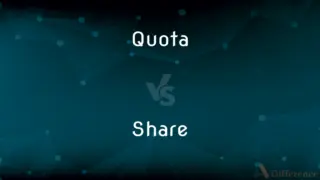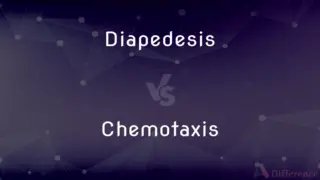Future vs. Upcoming — What's the Difference?
By Maham Liaqat & Urooj Arif — Updated on May 2, 2024
"Future" refers to a time that is yet to come, encompassing any point beyond the present, while "upcoming" specifically denotes something imminent or scheduled soon.

Difference Between Future and Upcoming
Table of Contents
ADVERTISEMENT
Key Differences
"Future" broadly indicates any period that lies ahead, suggesting an indefinite range of time. In contrast, "upcoming" is more immediate, referring to events or occurrences that are expected to happen soon.
The term "future" can apply to both distant and near events without a specific timeframe. On the other hand, "upcoming" typically involves a clear proximity to the present.
In discussions about plans or expectations, "future" can be used abstractly without implying any specific dates or details. Whereas, "upcoming" is often associated with specific events like meetings, releases, or projects.
When people talk about the "future," they might be contemplating long-term possibilities or hypothetical scenarios. Meanwhile, "upcoming" is used for definite arrangements that are near on the calendar.
The flexibility of "future" allows it to be a philosophical or existential topic, exploring themes of destiny or potential. Conversely, "upcoming" is practical and usually linked to concrete plans or schedules.
ADVERTISEMENT
Comparison Chart
Timeframe
Indefinite
Near future, specific
Usage Context
General, broad
Specific, scheduled
Connotation
Long-term or any
Imminent, soon happening
Associated Terms
Destiny, life
Events, meetings
Planning Scope
Strategic, long-term planning
Tactical, short-term planning
Compare with Definitions
Future
A grammatical tense expressing an action that has not yet occurred.
They will go to Spain next summer.
Upcoming
Imminent or approaching.
They discussed the agenda for the upcoming meeting.
Future
Used in discussing probabilities or possibilities.
The future of technology is highly unpredictable.
Upcoming
Pertaining to something that will happen in the near future.
The team is preparing for the upcoming season.
Future
The future is the time after the present. Its arrival is considered inevitable due to the existence of time and the laws of physics.
Upcoming
Appearing or being made available shortly.
The upcoming book release is highly anticipated.
Future
The indefinite time yet to come
Will try to do better in the future.
Upcoming
Scheduled to occur soon.
The upcoming concert is generating a lot of excitement.
Future
Something that will happen in time to come
"The future comes apace" (Shakespeare).
Upcoming
Refers to time that is just ahead.
They announced the plans for the upcoming year.
Future
A prospective or expected condition, especially one considered with regard to growth, advancement, or development
A business with no future.
Upcoming
Upcoming (formerly Upcoming.org) is a social event calendar website that launched in 2003, founded by Andy Baio.
Future
Often futures A financial instrument that obligates the holder to buy or sell an asset at a set price on a specified date in the future
A market for copper futures.
Upcoming
Occurring soon; forthcoming.
Future
The form of a verb used in speaking of action that has not yet occurred or of states not yet in existence.
Upcoming
Happening or appearing in the relatively near future.
We are ready for whatever is upcoming.
The Federal budget lays out government spending for the upcoming budget year.
Future
A verb form in the future tense.
Upcoming
Eggcorn of up-and-coming
Future
That is to be or to come; of or existing in later time.
Upcoming
Pertaining to to upcome
Future
The time ahead; those moments yet to be experienced.
Upcoming
The act of coming up.
Future
Something that will happen in moments yet to come.
Upcoming
Comeuppance; deserts
Future
Goodness in what is yet to come. Something to look forward to.
There is no future in dwelling on the past.
Upcoming
The activity of to upcome
Future
The likely prospects for or fate of someone or something in time to come.
Upcoming
Present participle of upcome
Future
(grammar) Verb tense used to talk about events that will happen in the future; future tense.
Upcoming
Of the relatively near future;
The approaching election
This coming Thursday
The forthcoming holidays
The upcoming spring fashions
Future
(finance) futures
Future
An object that retrieves the value of a promise.
Future
(sports) A minor-league prospect.
Future
Having to do with or occurring in the future.
Future generations will either laugh or cry at our stupidity.
Future
That is to be or come hereafter; that will exist at any time after the present; as, the next moment is future, to the present.
Future
Time to come; time subsequent to the present (as, the future shall be as the present); collectively, events that are to happen in time to come.
Future
The possibilities of the future; - used especially of prospective success or advancement; as, he had great future before him.
Future
A future tense.
Future
The time yet to come
Future
A verb tense that expresses actions or states in the future
Future
Bulk commodities bought or sold at an agreed price for delivery at a specified future date
Future
Yet to be or coming;
Some future historian will evaluate him
The present leader
Articles for present use
The present topic
The present system
Present observations
Future
Effective in or looking toward the future;
He was preparing for future employment opportunities
Future
Coming at a subsequent time or stage;
The future president entered college at the age of 16
Awaiting future actions on the bill
Later developments
Without ulterior argument
Future
(of elected officers) elected but not yet serving;
Our next president
Future
A verb tense or other formation referring to events or states that have not yet happened;
Future auxiliary
Future
A period that will come after the present.
She dreams of a successful career in the future.
Future
Yet to be; prospective.
The future CEO of the company starts as an intern.
Future
In finance, a contract for assets bought at agreed prices but delivered and paid for later.
He trades futures on the stock market.
Common Curiosities
How does "upcoming" relate to planning?
"Upcoming" is often used in contexts where events are planned and expected to occur shortly.
Are "future" and "upcoming" interchangeable?
No, they are used in different contexts; "future" is more general, while "upcoming" is specific and imminent.
What type of events can be described as "upcoming"?
"Upcoming" is typically used for events that are scheduled and close at hand, such as meetings, releases, or sports events.
How might one use "future" in a philosophical discussion?
In philosophical discussions, "future" can be used to explore concepts of fate, destiny, or the nature of time itself, often without any specific temporal limitations.
What is the difference between "future" and "upcoming"?
"Future" can refer to any time that hasn't occurred yet, while "upcoming" specifically targets the near future.
Can "upcoming" refer to distant events?
No, "upcoming" typically refers to events expected to happen soon.
Can "upcoming" be used in a non-temporal context?
No, "upcoming" is almost exclusively used to describe temporal events that are near in the future.
Is "future" used only in terms of time?
No, it can also refer to potential outcomes or possibilities.
Is there a specific grammatical tense associated with "upcoming"?
No, "upcoming" is an adjective and does not have an associated grammatical tense; however, it describes events that are about to happen soon.
What implications does "upcoming" have in business contexts?
In business, "upcoming" is crucial for preparing for near-term obligations or opportunities, such as upcoming meetings, product launches, or quarterly reports.
How does the use of "future" impact conversations about long-term goals?
Using "future" in discussions about long-term goals emphasizes open-ended possibilities and a wider scope of time, allowing for more speculative and broad-based planning.
Share Your Discovery

Previous Comparison
Quota vs. Share
Next Comparison
Diapedesis vs. ChemotaxisAuthor Spotlight
Written by
Maham LiaqatCo-written by
Urooj ArifUrooj is a skilled content writer at Ask Difference, known for her exceptional ability to simplify complex topics into engaging and informative content. With a passion for research and a flair for clear, concise writing, she consistently delivers articles that resonate with our diverse audience.












































